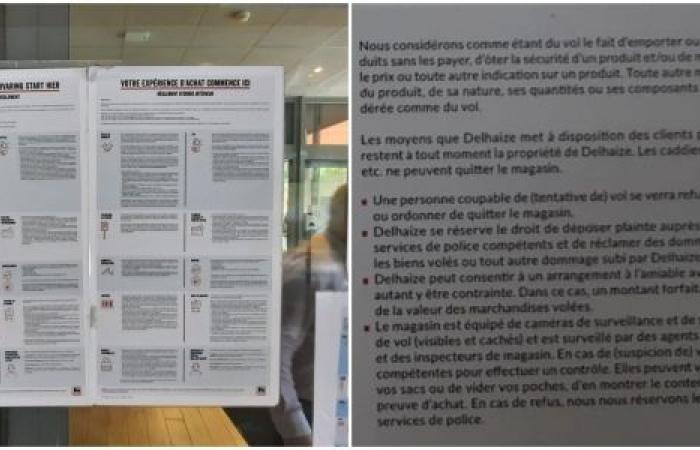Discontent is mounting at the Delhaize Chazal in Schaerbeek, where customers accuse the store of imposing fines after forgetting the self-scan, which can climb up to… 250 euros!
Since the establishment became franchised in April, several customers have reported having been forced to pay administrative fines after forgetting to scan an item during their self-scan. This situation raises many questions about the legality of these practices.
Among the testimonies received, there is that of Vincent (not his real name), who regularly shops in this store. “Just for a 50 cent bag that wasn’t scanned, they called a customer and asked him for 250 euros. Sometimes you have to pay in cash, sometimes it’s via his phone. If the customer let it happen, they do it, and it goes into their pocket. Generally, it’s for things they forget, like a tomato that they forgot to weigh, a bag… It’s often for stupid things like that.” , deplores the Brussels resident.
According to our witness, everything is in place to catch offenders: “There is someone at the lobby cash register who is there to monitor. But if he sees that there is something overlooked on his control screen, he will not report it. He will wait for the customer to pass the gate to check it Then the bosses come, they take you into the office and threaten to call the police if you don’t pay the fine. People are afraid of the police, and so they pay the fine. most of the time.” According to Vincent, this situation is not exceptional and happens regularly: “There are plenty of customers who are being fooled,” he denounces.
Indeed, the store is the subject of numerous similar complaints on the internet, as evidenced by customer feedback on Google: “Be careful with self-scanning. An oversight can be costly. I had to pay a €50 fine for forgetting to scan a shopping bag costing less than €1”, plagues a customer.
Another customer was less lucky since she had to pay 250 euros: “After nearly 30 years of frequenting this Delhaize and knowing that this was my first non-compliant inspection in years, it hurts a lot. I really feel like I was cheated,” she fumes. Some testimonies also highlight the absence of a receipt or bank trace for these payments, as they are often made in cash.
Internal regulations
We contacted the management of Delhaize Chazal in Schaerbeek to obtain clarification on these various complaints. When asked whether fines are imposed for oversights, the store is categorical: “When it is clear that there is an oversight, we advise the customer to be attentive and not hesitate to seek help from employees present in the area. In these cases, there is no , no fine”, manages the store.
Fines are therefore only applied in more serious cases, when the amount or number of unscanned items is too large to be considered a simple error. “For example, 5 items scanned out of 10 or 4 items scanned at 1 euro and the 5th at 20 euros unscanned”would result in a fine because, according to Delhaize, “it’s pretty clear that it can’t be an error during the payment process.”
Regarding the legal basis of these fines, they are based on the “internal regulations established by Delhaize”, we are told. In some cases, “the police advise imposing dissuasive fines as well.” In these regulations displayed at the entrance to the store, it is stipulated that in the event of theft, “Delhaize can agree to an amicable settlement with the customer without being forced to do so. In this case, a lump sum is calculated in addition to the stolen goods.”

As for fine amounts, which can vary considerably, the store explains that they are determined based on the number of items not scanned and their value. “For example, 30 items in the shopping cart, 16 of which were not scanned, could result in a fine of 250 euros, because it is clear that it cannot be an error and that the amount is high,” we are told.
Delhaize also refutes allegations that fines must be paid in cash or by telephone, without a receipt: “Customers pay as they wish, some in cash, others by bank, Visa and others. They are given a receipt with the amount paid and the manager’s signature.” While Delhaize admits that self-scan errors are common, “this is not the case for those which lead to paying fines.” To prevent these oversights, the store has implemented several measures, including the display of internal regulations at the entrance and in the payment area, as well as the increased presence of Delhaize employees.
Finally, regarding possible flexibility in certain situations of inattention or forgetfulness, the store wants to be reassuring. “We have a large number of customers, more than 20,000 visits per week, so these are a few isolated cases. We are very flexible with our customers, we understand that careless errors and/or oversights are possible, but in these cases, our teams work on raising awareness and the importance of being attentive when using our crates.” However, fines generally concern “repeat offenders”, underlines the store, while claiming to be “always available and attentive to our customers who may have had a bad experience.”
Civil and criminal matters
Therefore, can customers be subject to these types of fines? “It all depends on what we base it on,” explains Audrey Dereymacker, spokesperson for the Brussels-North police zone. If the store considers the incident to be theft, and therefore a criminal offense, “It’s not something that the store or even the police can regender.” Indeed, if the police can make a report, “it is the courts which have the power to impose a fine in this type of situation.”
On the other hand, if the offense is considered administrative, the decision to impose a fine rests with the municipality and therefore with a sanctioning official. In the case of the store, the spokesperson for the Brussels-North police zone explains that this situation seems to fall more within the civil domain: “The fact that they display these regulations is a way of saying that when you enter the store, you accept this contract. So, we are in civil law.” In this way, the display of the internal regulations implies an agreement between the customer and the store.
In the event of suspected theft, the store has two options. Either he files a complaint, in which case “we move into criminal proceedings”, or he offers an amicable settlement by asking the customer to pay a fine. As for the legality of this type of transaction, Audrey Dereymacker specifies that it is not up to the police to rule on that.
We don’t even know the terms and the price, so it’s more than questionable
At Test-Achats, we believe that these internal regulations lack clarity. “Of course we can always stipulate an amicable arrangement, but in this case, we don’t even know the terms and the price, so it’s more than questionable,” explains Jean-Philippe Ducart, spokesperson for Test-Achats, who considers this regulation to be an unfair clause. “The means stipulated in these internal regulations border on arbitrary and their legality is more than questionable,” he insists.
Finally, the legality of these fines is also debated in the eyes of the FPS Justice. “The clause included in the internal regulations, which proposes either the filing of a criminal complaint, or the payment of a sum to avoid this complaint, is not an administrative sanction, but rather a compensation clause.“, comments Christine-Laura Kouassi, spokesperson for the FPS Justice. “The legality of such a clause raises questions and will have to be assessed by the judge hearing the question..” Thus, if these people subjected to this type of transaction decide to file a complaint, “it will be up to the judge to determine if it is legal”, she concluded.
Delhaize
schaerbeek
amende








